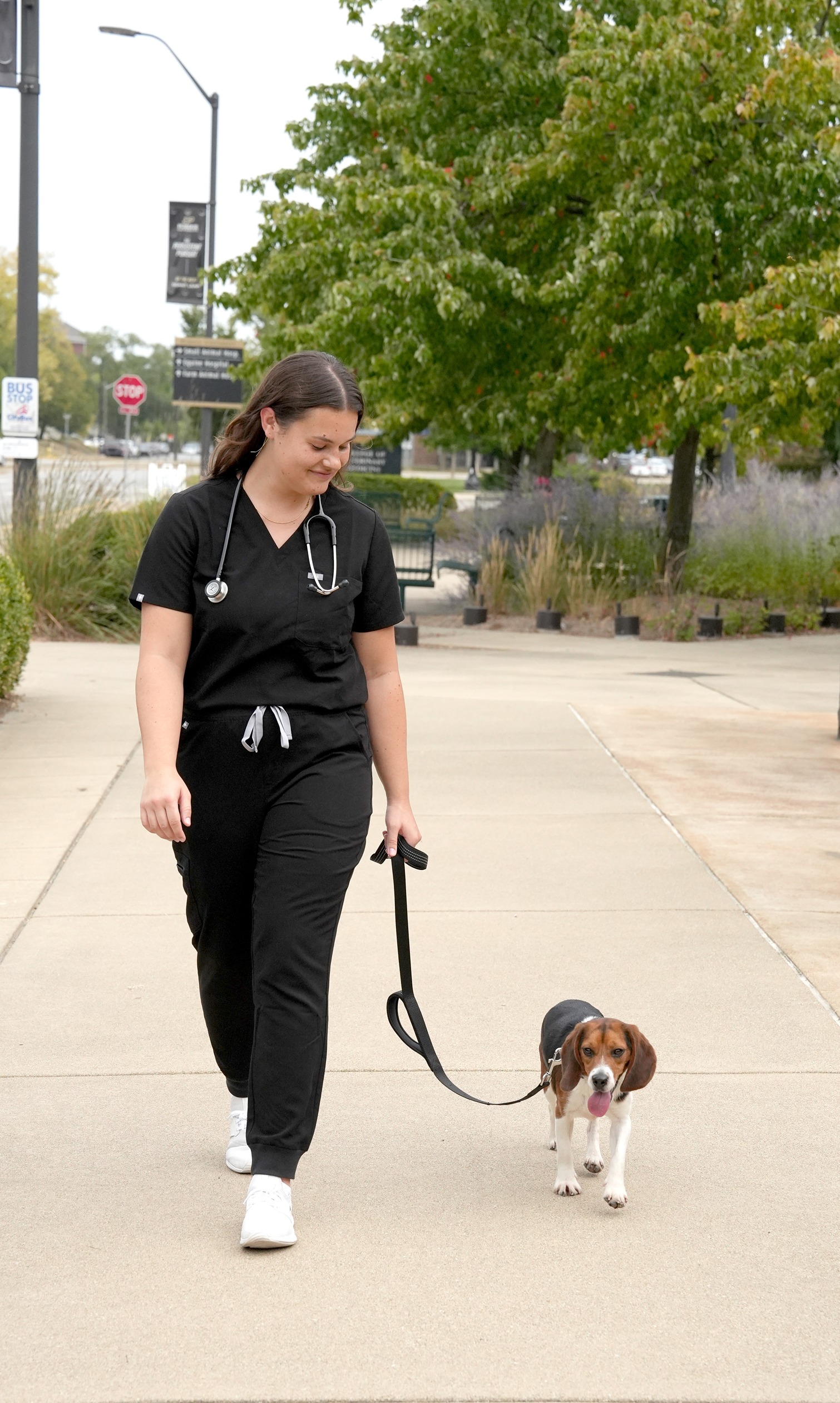As a first-year student in the Purdue College of Veterinary Medicine, Maya Fulton has quickly become known by her classmates and instructors as “the bug girl,” a nickname she earned because she graduated in May with a degree in entomology from the College of Agriculture.
Fulton came to Purdue knowing she wanted to become a veterinarian, but not that she wanted to pursue an entomology degree. She credits the Boiler Gold Rush Ag Carnival for helping her find her path that some would consider “different” compared to a typical veterinary student’s.
“All of the departments in the college had booths set up with students representing them. A lot of them were sort of crowded, except for Entomology’s. I actually looked at my friend and said, ‘What is Entomology,’” Fulton said with a laugh. “When we went over there to investigate, they let us give a tarantula a high-five and we held some beetles. All of this was stuff I never would have done before that moment, but I was in that mindset of being in a new place and setting out to try new things and make new friends.”
After that first experience, joining the entomology department felt like an easy choice, Fulton said.
“When I went to the pre-professional advising staff and told them I wanted to pursue entomology, they were a little surprised, but they were supportive of me,” Fulton said. “It’s not as common of a path as something like animal sciences to get into vet school, but it was my path, and I fell in love with it.”
 Maya Fulton holds her entomology pin collection on the steps of Lynn Hall.
Maya Fulton holds her entomology pin collection on the steps of Lynn Hall. In some ways, Fulton said she feels her entomology degree gives her a leg up among her peers. When it came to certain areas, like biology for instance, she was able to connect the concepts in her veterinary prerequisite class to physical specimens she was learning about in entomology courses.
Fulton also chose to fill her schedule with animal sciences classes, like animal physiology and animal anatomy, to help with her veterinary school applications. This blend of biophysical science courses led Fulton interning in the lab of Stacy Lindshield, associate professor of anthropology in the College of Liberal Arts, where she studied the nutritional ecology of a chimpanzee population in Senegal.
Fulton’s drive to reach her dreams is something Amanda Wilson, academic advisor and graduate program administrator for the entomology department, said she was immediately struck by upon meeting her. Fulton made the time for leadership opportunities in her major, including volunteering in the Boiler Bug Barn and local animal shelters, and working as an animal-care intern for the Columbian Park Zoo in Lafayette.
 “From the beginning, she knew she wanted to go onto veterinary school, so right away we started creating that path within the insect biology curriculum,” Wilson said. “Maya is one of the most exceptional students I’ve had the pleasure of advising. Although she often had a full schedule, she always took time to mentor younger students or lend a hand. Maya has always been a positive and responsible student, and I am so proud of what she has accomplished so far."
“From the beginning, she knew she wanted to go onto veterinary school, so right away we started creating that path within the insect biology curriculum,” Wilson said. “Maya is one of the most exceptional students I’ve had the pleasure of advising. Although she often had a full schedule, she always took time to mentor younger students or lend a hand. Maya has always been a positive and responsible student, and I am so proud of what she has accomplished so far."
Fulton’s said she hopes her time in entomology can be emulated by future students as well, knowing the sky is the limit.
“I was interested in everything, and my curiosity turned out to be one of my strengths to get me to where I wanted to be,” Fulton said. “Any time you can find something you’re passionate about and can build a career off it, you absolutely should. I’m known as the ‘bug girl’ among my classmates now, and just having that little identifier has already helped me build new connections and make friends. It’s those connections that really get us through our schooling.”





